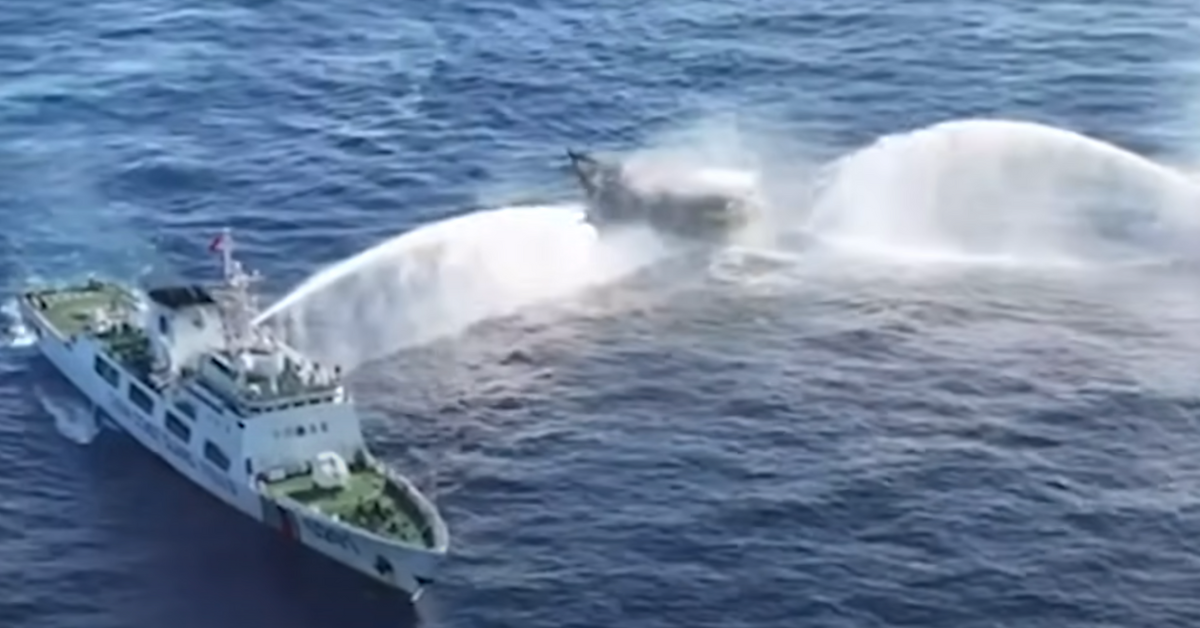The calm waters of the West Philippine Sea have once again been disturbed by the turbulent waves of Chinese aggression. In a recent alarming incident, tensions between China and the Philippines rose as Chinese forces fired a water cannon at Philippine Marines in disputed waters. Let's dive deeper into this troubling event and explore its implications on regional relations.
Chinese Aggression in the West Philippine Sea
The West Philippine Sea has long been a hotbed of territorial disputes, with China's aggressive actions frequently making headlines. The strategic importance of this region, rich in resources and vital sea lanes, has drawn the attention of multiple nations vying for control. Chinese encroachment into these waters has sparked tensions not only with the Philippines but also with other neighboring countries.
Despite international condemnation and legal rulings invalidating China's expansive claims in the South China Sea, Beijing continues to assert its dominance through militarization and coercive tactics. These provocative actions have escalated confrontations at sea and fueled concerns about regional stability.
The recent incident involving a water cannon being fired at Philippine Marines is just another illustration of China's assertiveness in asserting its maritime claims. Such acts risk inflaming already delicate relations and heightening security risks for all parties involved.
What Happened: Chinese Coast Guard Fires Water Cannon at Philippine Marines
In a recent alarming incident in the West Philippine Sea, tensions between China and the Philippines escalated when the Chinese Coast Guard fired water cannons at Philippine Marines. The provocative action further strained relations in an already contentious maritime region.
The aggressive move by the Chinese Coast Guard was met with swift condemnation from Philippine authorities, who labeled it as a violation of their sovereignty and an act of intimidation. The use of water cannons underscores China's assertive stance in asserting its territorial claims in the area.
This brazen display of aggression not only threatens peace and stability in the region but also raises concerns about China's disregard for international norms and agreements. Such incidents highlight the complex geopolitical dynamics at play in the West Philippine Sea, where competing territorial claims continue to fuel tensions among neighboring nations.
Reactions and Responses: The Philippines, China, and International Community
The recent incident of the Chinese Coast Guard firing water cannon at Philippine Marines in the West Philippine Sea has sparked varied reactions and responses from different parties. The Philippines immediately condemned the aggression, emphasizing its sovereignty over its waters. China, on the other hand, downplayed the event as a routine operation to uphold its own claims in the disputed area.
The international community closely monitored this escalation of tensions between China and the Philippines in one of the world's most hotly contested regions. Concerns were raised about potential further militarization and destabilization if such incidents continue unchecked. Calls for peaceful resolutions through dialogue and adherence to international law were echoed by various countries.
As these events unfold, it remains crucial for all involved parties to exercise restraint and prioritize diplomatic solutions that promote stability in the region.
Background on the Dispute: Territorial Claims in the West Philippine Sea
Nestled in the heart of Southeast Asia, the West Philippine Sea has long been a focal point for territorial disputes. The region is rich in natural resources and crucial for maritime trade routes.
At the core of these conflicts are competing territorial claims between multiple nations, with China asserting historical rights based on ancient maps, while the Philippines relies on international law to defend its sovereignty.
The United Nations Convention on the Law of the Sea (UNCLOS) plays a pivotal role in defining maritime boundaries and resolving disputes peacefully. However, despite efforts to seek diplomatic solutions, tensions remain high as countries continue to assert their claims through military presence and aggressive actions.
The intricate web of overlapping claims sets the stage for potential conflict escalation as each nation seeks to protect its interests and assert control over strategic areas in this geopolitically significant region.
Past Incidents of Aggression: A Pattern of Escalating Tensions
The recent incident of Chinese aggression in the West Philippine Sea is not an isolated event. It adds to a series of past incidents that have contributed to escalating tensions in the region. These actions highlight a pattern of behavior by China that raises concerns among neighboring countries and the international community.
From maritime standoffs to territorial disputes, there have been several instances where China's assertiveness has challenged the status quo in the West Philippine Sea. The aggressive maneuvers by Chinese vessels and military forces have sparked diplomatic confrontations and increased mistrust between nations.
Each confrontation builds on previous ones, creating a cycle of escalation that further strains relations between China and its neighbors. As these incidents continue to unfold, it becomes crucial for all parties involved to find peaceful resolutions and maintain stability in the region.
The history of aggression in the West Philippine Sea serves as a reminder of the complex geopolitical dynamics at play and underscores the importance of dialogue and diplomacy in preventing further escalations.
Possible Implications for Future Relations between China and the Philippines
Possible Implications for Future Relations between China and the Philippines
The recent incident of the Chinese Coast Guard firing a water cannon at Philippine Marines in the West Philippine Sea is just one in a series of escalating tensions between the two countries. The ongoing territorial disputes, coupled with China's assertive actions, have strained diplomatic relations.
Moving forward, there are potential implications for future relations between China and the Philippines. The continued aggression from China may push the Philippines to seek stronger alliances with other regional powers such as Japan or the United States. This could lead to increased military presence in the region and further heighten tensions.
On the other hand, both countries have expressed their commitment to resolving conflicts through peaceful means and dialogue. Diplomatic efforts must be prioritized to prevent any further escalation that could potentially lead to armed conflict.
Finding a mutually acceptable resolution to territorial disputes in the West Philippine Sea will be crucial in determining how relations between China and the Philippines evolve in the coming years. It remains to be seen whether both nations can navigate these challenges effectively and maintain stability in this geopolitically significant region.
Watch the video here Water Cannon of Chinese to Philippine Marines Video.
















Article Comments
What's on your mind? Leave a Comment.